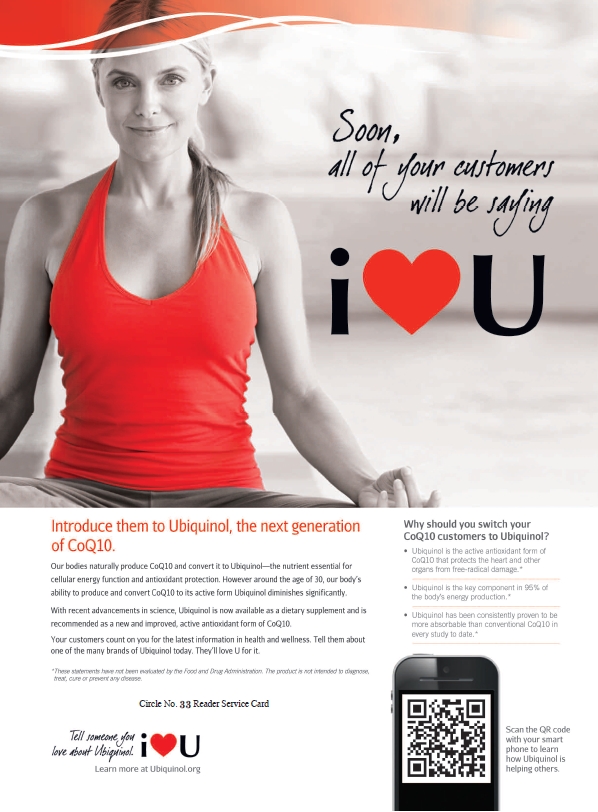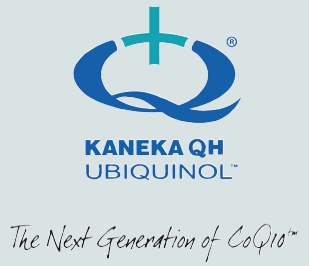Kaneka QH UbiquinolTM
What Is Ubiquinol?
Ubiquinol is the reduced, active antioxidant form of Coenzyme Q10 (CoQ10). Produced naturally within the body, Ubiquinol is CoQ10 that has been converted (“reduced”) for use in the cellular energy production process. In addition to its critical role in energy production, it is the strongest lipid-soluble antioxidant, protecting the body’s cells from oxidative stress that can cause damage to proteins, lipids and DNA.
Kaneka Supports Clinical Research
Kaneka was the first company to produce CoQ10 as a congestive heart failure drug in Japan in the 1960s. Over the past 50 years, there have been thousands of clinical trials conducted with CoQ10 on everything from heart health to neurological function. Nearly every major trial has been conducted with Kaneka Q10™ or Kaneka QH Ubiquinol™, as it is known throughout the research world as the gold-standard in CoQ10. Kaneka’s CoQ10 products are all-natural and the most bio-identical to the CoQ10/Ubiquinol produced in the human body.
Why Should I Be Concerned about Declining Ubiquinol Levels?
Declines in Ubiquinol result in less cellular energy and diminished protection against oxidative stress. Ubiquinol provides a strong first-stage defense against this cellular oxidative damage and needs to be replenished to maintain optimum health.
An increasing number of scientific reports indicate that dramatic decreases in Ubiquinone levels and increased oxidative stress are associated with the aging process and with many age-related conditions.
Why Does Supplementing with Ubiquinol Become More Important as I Age?
As a healthy 20-year-old, you readily produce all of the CoQ10 you can use and efficiently convert it into Ubiquinol. In fact, the predominant form (over 95%) of CoQ10 in the plasma and tissues of a healthy individual is the reduced Ubiquinol form.
However, age and other factors can hinder the body’s ability to produce and metabolize CoQ10. Some reasons for this include increased metabolic demand, insufficient dietary intake, oxidative stress, or any combination of these things. Some reports say this decline becomes apparent around 40 years old, although it can begin as early as 20 in some cases. As the body’s ability to produce and reduce CoQ10 begins declining, supplementation with Ubiquinol becomes increasingly important to maintaining good health.
How Do I Know Which Form of CoQ10 Is Right for Me?
For young, healthy individuals, conventional CoQ10 should usually be sufficient for supplementation needs. Healthy adults in their 20s can easily produce CoQ10 and convert it into Ubiquinol; thus, supplementing with conventional CoQ10 likely will be adequate to optimize their Ubiquinol and CoQ10 levels.
For individuals who are 30+, Ubiquinol is likely more beneficial since the body’s ability to produce CoQ10 and convert it into Ubiquinol is diminished. Optimal Ubiquinol levels are important for those looking to support cardiovascular, neurological and liver health. Because Ubiquinol is pre-converted, it is ready for immediate use by the body, making it ideal for those unable to efficiently reduce CoQ10 in the body.
How Much Ubiquinol Should I Take?
The recommended dose of Ubiquinol varies based on each individual’s needs. However, those who are older or suspect they have decreased CoQ10 due to illness may want to start supplementing with 200–300 mg of Ubiquinol per day. Studies show that the CoQ10 plasma levels plateau at about 2–3 weeks at this dose. After that, 100 mg per day is a good maintenance dose.
Can I Get Ubiquinol from the Foods I Eat?
You can get Ubiquinol as well as Ubiquinone in small amounts from your diet; however, you would have to eat the foods in such large amounts to meet your CoQ10 supplementation needs that it would not be feasible. And because the body’s ability to convert Ubiquinone to Ubiquinol declines with age, food becomes a less practical source of Ubiquinol for older individuals and those suffering from age-related conditions.
What Are the Key Health Benefits of Ubiquinol?
• Promoting heart health
Ubiquinol is essential for heart health because it provides cellular energy to the heart, the organ in the body that requires the most energy to perform at its best. Unlike conventional CoQ10, Ubiquinol is an antioxidant, so it provides even more protection to the heart.
• Accompanying statin drugs
Ubiquinol also is ideal for persons on cholesterol-lowering statin drugs. In addition to reducing the amount of bad cholesterol in the liver, statin drugs can reduce the amount of CoQ10 in the liver as well. A lack of CoQ10 in the body can lead to chronic fatigue and muscle pains.
• Sustaining natural energy
Health conditions such as stress, fatigue and aging diminish the amount of Ubiquinol found in the body. Ubiquinol is a key component in 95 percent of the body’s energy production. Taking an Ubiquinol supplement helps to restore optimal levels the body needs to feel healthy and energized. Although most will not get a stimulant effect from taking Ubiquinol, many describe the energy benefits from Ubiquinol as feeling a lack of tiredness that they usually experience throughout the day.
• Promoting healthy vital organs
Supplementing with Ubiquinol will restore healthy levels of CoQ10 in plasma and organs for more efficient energy production. This typically results in more energy and stamina, as well as better overall health.
• Slowing of the aging process
Ubiquinol is the strongest known lipid soluble antioxidant. It protects cells against damage from free radicals and oxidative stress, which are associated with the aging process and many age-related conditions.

Published in WholeFoods Magazine, September 2011









